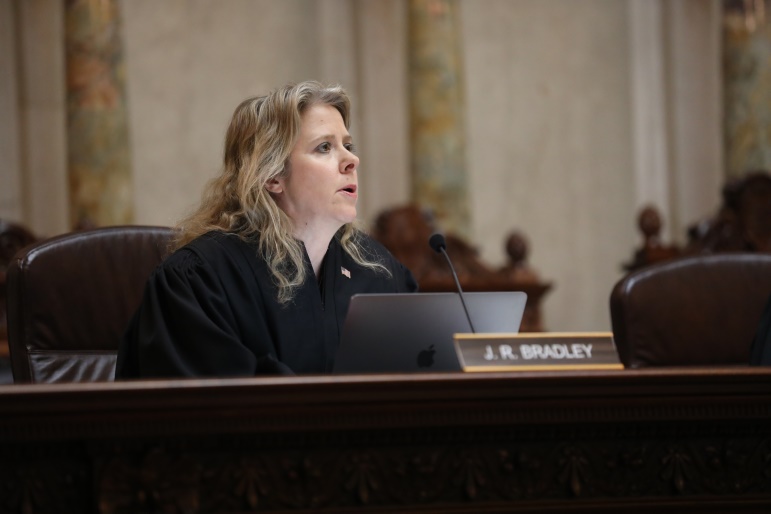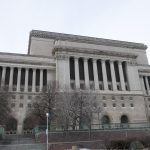Justice Rebecca Bradley’s Favorite Obsession
She's death on 'unelected bureaucrats." What's that all about?
Today’s right wants to maximize the power of the executive when the executive is Donald Trump but minimize executive power when the executive is a Democratic governor.
Wisconsin Supreme Court Justice Rebecca Bradley’s favorite epithet appears to be “unelected bureaucrat.” From the Court’s May 2020 decision in Wisconsin Legislature v. Palm to this month’s Evers v. Marklein decision she has repeatedly hammered home that unelected bureaucrats are something to be greatly feared.
The high court’s then-conservative majority ruled against Palm. In addition to joining the majority, Rebecca Bradley produced a concurring opinion of her own. This opinion included numerous attacks on Palm’s unelected status and her lack of an election. It should be noted that Bradley seems to confuse rules with laws. Here is what she says about the powers and duties of the department of Health Services:
Under the Wisconsin Constitution, the legislature makes the laws; an unelected cabinet secretary serving in the executive branch cannot unilaterally do so.
However, section 252.02(3) of Wisconsin statutes states that “The department may close schools and forbid public gatherings in schools, churches, and other places to control outbreaks and epidemics.”
In an unusual move, Bradley incorporated several pages of transcripts of the public hearing in her concurrence. In the hearing she told the state’s attorney:
I think there is a constitutional problem with the legislature giving away this much power to an unelected cabinet secretary.
Later she repeated that thought:
.. I don’t think the legislature can give that kind of power to an unelected individual.
Following the transcript, she opines that:
As a general principle, it is the duty of the legislature to create the law, and any delegation of lawmaking responsibility to administrative agencies like DHS must be carefully circumscribed in order to avoid the people being governed by unelected bureaucrats.
Bradley quotes from her concurrence in an earlier case:
In facilitating the vast expansion of the administrative state, the legislative and executive branches transferred power from the people’s elected representatives and elected executives, bestowing it upon unelected and unaccountable bureaucrats, thereby jeopardizing the constitution’s safeguards against the tyrannical concentration of power.
Today, the threat from unelected bureaucrats lives on, at least in Bradley’s imagination. Evidence for this is contained in the latest opinion in a case called Tony Evers v. Howard Marklein, which challenged Wisconsin laws which gave legislative committees a veto power over rules issued by Wisconsin government agencies. On July 8, 2025, the court majority ruled that this arrangement violated the Wisconsin Constitution.
In response, Rebecca Bradley filed a dissent. Following a reference to Bruce Springsteen, the dissent starts with:
The majority invokes the Wisconsin Constitution to take power from the People’s elected representatives in the legislature and bestow it on the executive branch, empowering unelected bureaucrats to rule over the People.
Later, she returns to the supposed danger posed by unelected bureaucrats:
What restricts the power of the unelected bureaucrats to impose rules on the people of Wisconsin and penalize them for noncompliance? According to the majority, nothing at all.
Later the threat of power-hungry unelected bureaucrats returns once again:
The People didn’t delegate any powers to unelected bureaucrats, much less the lawmaking power.
This obsession about unelected bureaucrats is not limited to the Palm and Marklein cases. For example, in a case called Teigen v. Wisconsin Elections Commission, Bradley writes:
When the state’s highest court refuses to uphold the law, and stands by while an unelected body of six commissioners rewrites it, our system of representative government is subverted.
The unelected body of six commissioners referred to in this instance is the Wisconsin Elections Commission, whose members are appointed by legislative leaders (four members of the commission) and governor (two members).
Another example of Bradley obsession is contained in a case called Billie Johnson, et.al., initiated to update legislative districts to reflect the 2020 Census. Her reference to “unelected interest groups” was aimed at dismissing the concern among many groups that the existing maps aimed at continuing to entrench Republicans in power.
Attempting to redress the criticisms of the current maps advanced by multiple intervenors would amount to a judicial replacement of the law enacted by the people’s elected representatives with the policy preferences of unelected interest groups, an act totally inconsistent with our republican form of democracy.
This history leaves us with several issues. One is that Andrea Palm, like other cabinet secretaries, served at the pleasure of the Governor and was accountable to the people in the same way the Governor was. The implication of Bradley’s attack on Palm for being an unelected bureaucrat is that we should make Palm—and presumably other cabinet positions—run for election.
After previous health emergencies, the people chose to grant broad powers to the state’s public health agency to do what’s necessary to fight a pandemic.
Bradley’s use of “unelected bureaucrat” reflects an attempt to delegitimize the target, whether it is Andrea Palm, the six members of the Wisconsin Elections Commission, or members of the public opposed to the gerrymander. But from the beginnings of the American democracy unelected appointees have helped run government and often held considerable power. Bradley’s stance would seem to suggest our nation’s nearly 250-year history has repeatedly violated the Constitution.
If you think stories like this are important, become a member of Urban Milwaukee and help support real, independent journalism. Plus you get some cool added benefits.
Data Wonk
-
Life Expectancy in Wisconsin vs. Other States
 Dec 10th, 2025 by Bruce Thompson
Dec 10th, 2025 by Bruce Thompson
-
How Republicans Opened the Door To Redistricting
 Nov 26th, 2025 by Bruce Thompson
Nov 26th, 2025 by Bruce Thompson
-
The Connection Between Life Expectancy, Poverty and Partisanship
 Nov 21st, 2025 by Bruce Thompson
Nov 21st, 2025 by Bruce Thompson





















